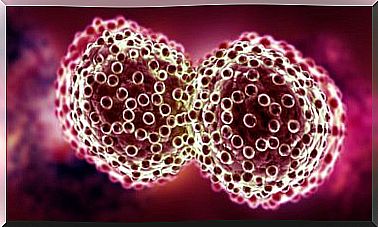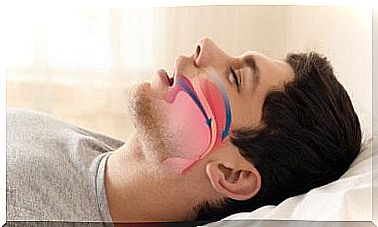How Does Caffeine Work In The Brain?
Caffeine in the brain modifies the rhythm of sleep and wakefulness, affects cognitive processes and even mood. In moderate amounts it produces great benefits, but its excess can bring adverse effects.

Most of us know the basic effects of caffeine on the brain: it generates more attention and revitalizes us. That is why it is so common for coffee to be the first drink we drink in the morning, as it helps us to finish waking up for the daily workday.
The truth is that the action of caffeine in the brain is not limited to increasing the state of attention, but goes much further. Experts agree that drinking coffee in moderate amounts is a healthy practice. It is estimated that up to 80% of the adults in the world drink coffee.
However, when coffee is consumed in very high volumes it causes various problems. Likewise, another of the effects of caffeine in the brain is to generate dependence, so stopping taking it gives rise to withdrawal syndrome. Let’s look at the subject in more detail.
Caffeine in the brain
As is known, the active ingredient in coffee is caffeine, and this is a psychoactive substance. In fact, it is the most widely used psychoactive in the world. It belongs to the alkaloid family, which also includes drugs such as morphine, nicotine or cocaine.

The action of caffeine in the brain is very powerful. From the neurobiological point of view, it modifies the state of consciousness, activating or increasing the level of alertness. It also affects cognitive processes and has psychological effects on mood.
This is because caffeine is capable of modifying the action of neurotransmitters in the brain. Additionally, coffee and caffeine also influence a number of other important processes in the body, such as digestion, metabolism and vision.
Caffeine, adenosine and adrenaline
From the moment we wake up, and throughout the day, the body naturally produces a substance called adenosine. This is responsible for the feeling of tiredness and leads us to feel sleepy at night. If we drink coffee, this process can be altered.
Caffeine is an antagonist of adenosine, which, simply put, means that one blocks the action of the other. The result is that we do not feel sleepy or do not feel it at the proper intensity. On the other hand, this interaction between caffeine and adenosine leads the pituitary to release hormones that will stimulate the adrenal glands to produce adrenaline.

By having caffeine in the brain, with adenosine basically blocked and increased production of adrenaline, it is as if we were sending a warning message to the body. This leads to an increased heart rate and more blood pumping, as well as more rapid breathing.
All of this together makes us feel more anxious and irritable. Another additional effect is that caffeine prevents the reabsorption of dopamine, a neurotransmitter that also affects the process of fatigue and rest. The dopamine that is not reabsorbed increases its concentration, and that is part of the reason why we become addicted to coffee.
Discover more: Benefits and disadvantages of consuming coffee daily
Caffeine affects the frontal lobes in the brain
The team of Dr. Florian Koppelstaetter, from the Medical University of Innsbruck in Austria, presented a study on the subject. In this they affirm that caffeine activates the frontal lobes of the brain. This zone regulates processes such as attention and short-term memory .
There are other studies that show that caffeine in the brain also helps memories to be fixed more easily. However, this effect is only relevant in those who do not consume coffee too often.
Caffeine also increases the ability to concentrate, especially when we are fatigued. Although the available information indicates that when consumed in excess, it reduces performance in all areas and generates a state of great nervousness.
Other effects of caffeine on the body

Caffeine also helps some medications work faster and more effectively, such as ibuprofen, acetaminophen, or aspirin. In fact, there are health conditions in which coffee acts as a mild pain reliever, particularly in hypotensive headaches.
Coffee also makes you less hungry, although this sensation is neither durable nor relevant from the point of view of a weight loss plan. There are some studies showing that regular coffee drinkers are less likely to die from heart disease, cancer, and diabetes, among others.
Caffeine stays in the body for a long time. Its first effects are felt fifteen minutes after ingesting it and persist up to five or six hours later. That’s the reason why an afternoon coffee can ruin your night’s rest.









